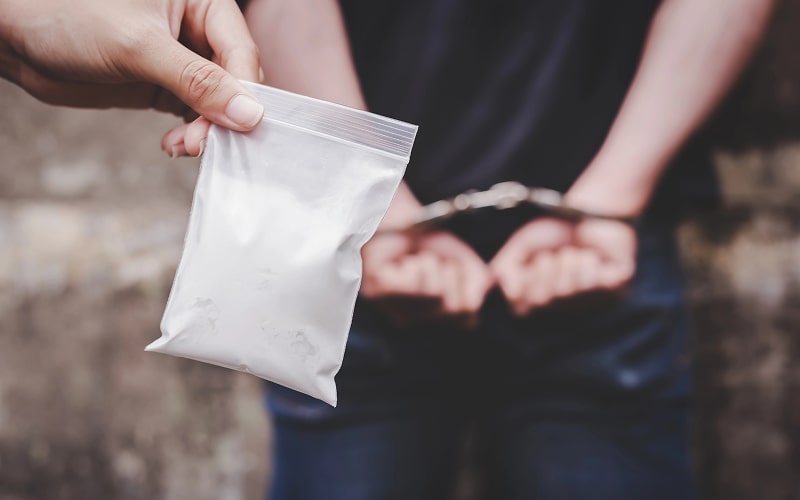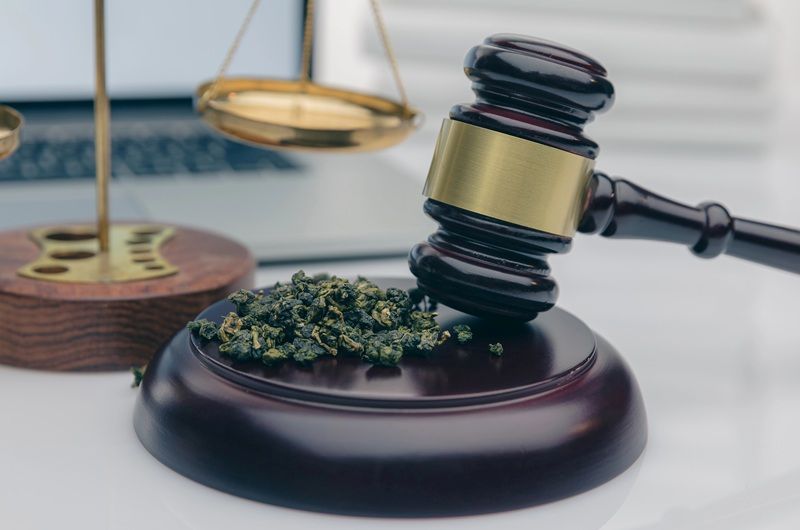Being charged with cocaine possession or trafficking in Fairfax County, Virginia, is a serious matter. The state’s strict drug laws impose severe penalties for such offenses. A conviction can lead to lengthy jail time, heavy fines, and a permanent criminal record. Even first-time offenders face life-changing consequences.
Understanding these laws and the potential outcomes is vital for anyone facing these charges. This article aims to guide individuals through Virginia’s cocaine laws, outline possible penalties, and discuss defense strategies. By the end, you will have a clearer picture of what to expect and how to take the necessary steps to protect their rights.

Understanding Cocaine Laws In Virginia
Virginia classifies cocaine as a Schedule II controlled substance due to its high potential for abuse and limited accepted medical use. This classification means that any possession, distribution, or manufacturing of cocaine is illegal and subject to stringent penalties.
Law enforcement takes cocaine-related offenses seriously, and even minor possession can result in severe consequences. Convictions can affect employment opportunities, housing eligibility, and future legal matters.
The law distinguishes between simple possession and trafficking based on the amount of the drug and the individual’s intent. Simple possession typically involves smaller quantities intended for personal use. Meanwhile, trafficking charges arise from larger amounts, suggesting an intent to distribute.
Intent can be inferred from evidence such as packaging materials, large sums of cash, or communication records indicating drug transactions. The presence of these factors can escalate charges and lead to harsher penalties. Possession with intent to distribute falls between simple possession and trafficking in severity.
If law enforcement believes a person planned to sell or distribute cocaine, the charges become more serious. Even a relatively small amount can lead to distribution charges if other circumstantial evidence supports the claim. The penalties for drug possession with intent to distribute are significantly more severe than those for simple possession.
Understanding these distinctions is vital, as they significantly impact the severity of the charges and potential penalties. Legal consequences vary depending on the amount of cocaine found and whether the case involves aggravating factors.
Knowing The Penalties For Cocaine Offenses
Virginia imposes harsh penalties for cocaine-related offenses. The severity of the punishment depends on the amount of cocaine involved, prior convictions, and whether there was an intent to distribute. Even first-time offenders can face life-altering consequences. Understanding these penalties is necessary for anyone charged with a cocaine-related crime.
Penalties For Simple Possession
Possessing cocaine for personal use is classified as a Class 5 felony in Virginia. A conviction can result in imprisonment of up to 10 years and fines reaching $2,500. However, judges have some discretion, particularly for first-time offenders.
Sometimes, the court may impose lighter sentences, such as up to 12 months in jail or probation with mandatory drug treatment programs. Repeat offenses, however, lead to harsher penalties and a greater likelihood of significant jail time.
Penalties For Possession With Intent To Distribute
Possession with intent to distribute carries harsh penalties, depending on the amount of cocaine involved. If the quantity is less than 500 grams, the charge becomes a felony, punishable by up to 40 years in prison and fines reaching $500,000.
When the amount reaches 500 grams or more, the law imposes a mandatory minimum sentence of five years and possibly a life sentence. Prosecutors use cash, packaging, or messages to prove intent, even with small amounts.
Penalties For Trafficking & Distribution
Cocaine trafficking carries the most severe penalties. A first offense can lead to a prison sentence between 5 and 40 years and fines up to $500,000. A second conviction results in a mandatory minimum of 10 years. A third offense can lead to life imprisonment.
Virginia law allows enhanced penalties for those distributing drugs near schools or involving minors in drug-related activities. The consequences of a cocaine-related conviction extend beyond prison time and fines. A felony record can make finding employment, securing housing, or obtaining professional licenses difficult.
Given these severe penalties, strong defense strategies are vital to help fight these charges.
Building A Strong Defense Strategy
A comprehensive approach is required to mount an effective defense against cocaine charges. The prosecution must prove that the defendant is guilty beyond a reasonable doubt. A strong defense can challenge evidence, dispute intent, and expose legal violations that weaken the case. Understanding available defense strategies is essential for anyone facing these serious charges.
Challenging The Legality Of Search & Seizure
The Fourth Amendment protects individuals from unlawful searches and seizures. If law enforcement searches without a warrant, probable cause, or valid consent, any evidence obtained may be inadmissible in court.
A defense attorney can file a motion to suppress evidence, arguing that police violated constitutional rights. If the court agrees, the prosecution could lose the key evidence, resulting in reduced charges or a dismissal.
Disputing The Intent To Distribute

Possession with intent to distribute is more serious than simple possession, but proving intent is not always straightforward. Prosecutors often rely on circumstantial evidence such as large quantities of drugs, scales, baggies, or significant amounts of cash.
However, these items alone do not prove intent. A criminal defense attorney can argue that the drugs were for personal use rather than distribution, significantly reducing the potential penalties.
Examining Law Enforcement Procedures
Law enforcement must follow proper legal procedures during an arrest and interrogation. If officers failed to read Miranda rights, coerced a confession, or engaged in entrapment, the defense can challenge the prosecution’s case.
Law enforcement must provide proper legal warnings; otherwise, a defense attorney can argue to suppress the statements. Unlawful tactics can lead to the dismissal of charges.
Proving Lack of Possession Or Knowledge
Sometimes, law enforcement wrongfully accuses a person of drug possession. The prosecution must prove that the defendant knowingly possessed the cocaine. If officers find drugs in a shared space, such as a car or apartment, the defense can argue that the defendant was unaware of them. If the defense raises enough doubt about ownership, the jury may acquit.
Negotiating For Charge Reductions Or Alternative Sentencing
For first-time offenders or those facing minor possession charges, an attorney may negotiate for alternative sentencing such as probation, drug treatment programs, or community service instead of jail time. Courts may be willing to offer these options, especially when rehabilitation is a viable path forward.
A strong defense can impact the outcome of a cocaine case. Attorneys must explore every legal strategy, from suppressing evidence to disputing intent. While solid defense matters, proper legal representation can make all the difference in fighting these charges successfully.
Getting Skilled Legal Representation
Having skilled legal representation is critical when facing cocaine charges in Virginia. Drug laws are complex and harsh, and the consequences of a conviction can be severe. An experienced attorney provides guidance, builds a strong defense, and ensures that the accused’s rights are fully protected.
Analyzing The Case & Identifying Weaknesses
A defense attorney carefully examines the case, searching for procedural errors, constitutional violations, or weak evidence. If the prosecution’s case has inconsistencies—such as improper searches, insufficient evidence, or unreliable witnesses—the attorney can challenge them.
By identifying these weaknesses, an attorney can create reasonable doubt, making it more difficult for the prosecution to secure a conviction.
Negotiating With Prosecutors For Lesser Charges
Many drug cases never reach trial and instead end through plea negotiations. Prosecutors often consider reducing charges in exchange for a guilty plea, especially when the defense presents strong counterarguments.
A skilled attorney can negotiate for alternatives such as probation, reduced sentences, or entry into a drug diversion program instead of prison time. These options can help a defendant avoid long-term consequences.
Providing Legal Guidance & Court Representation
Navigating the legal system alone can be challenging and confusing. A knowledgeable and experienced attorney can explain the legal process, outline possible outcomes, and ensure clients make informed decisions. In court, a defense attorney persuasively presents arguments, cross-examines witnesses, and challenges improper evidence.
Facing cocaine charges without legal representation can be risky. A conviction can have a lasting impact, affecting employment, housing, and future opportunities. Having strong legal representation can increase the chances of a favorable outcome.
An attorney who understands Virginia’s drug laws and legal system can help minimize penalties or achieve a case dismissal. Fairfax County Criminal Attorneys provides dedicated legal guidance support for those facing drug-related charges.
Fairfax County Criminal Attorneys Advocates In Drug Charge Cases
At Fairfax County Criminal Attorneys, we provide thorough legal support for individuals facing drug charges in Virginia. Our experienced defense team understands drug laws inside and out and works tirelessly to protect your rights.
We take a client-centered approach, ensuring clear communication and personalized strategies tailored to your unique situation. Our attorneys have a proven track record of successfully defending clients against cocaine possession and trafficking charges.
We meticulously examine every detail of your case to build a strong defense, challenging evidence, and procedures that may have violated your rights. By choosing Fairfax County Criminal Attorneys, you gain a steadfast advocate who will stand by your side through the legal process and achieve a favorable outcome.
Virginia’s strict drug laws impose severe penalties for cocaine possession and trafficking, making legal defense critical. Understanding the differences between possession, intent to distribute, and trafficking can impact case outcomes. Strong defense strategies may help reduce charges, such as challenging searches or disputing intent.
Legal representation ensures proper guidance, negotiations, and courtroom advocacy. Facing such charges alone can be challenging, but you can receive dedicated support from Fairfax County Criminal Attorneys. We are committed to providing tailored and effective defense strategies to help you navigate these challenges.




